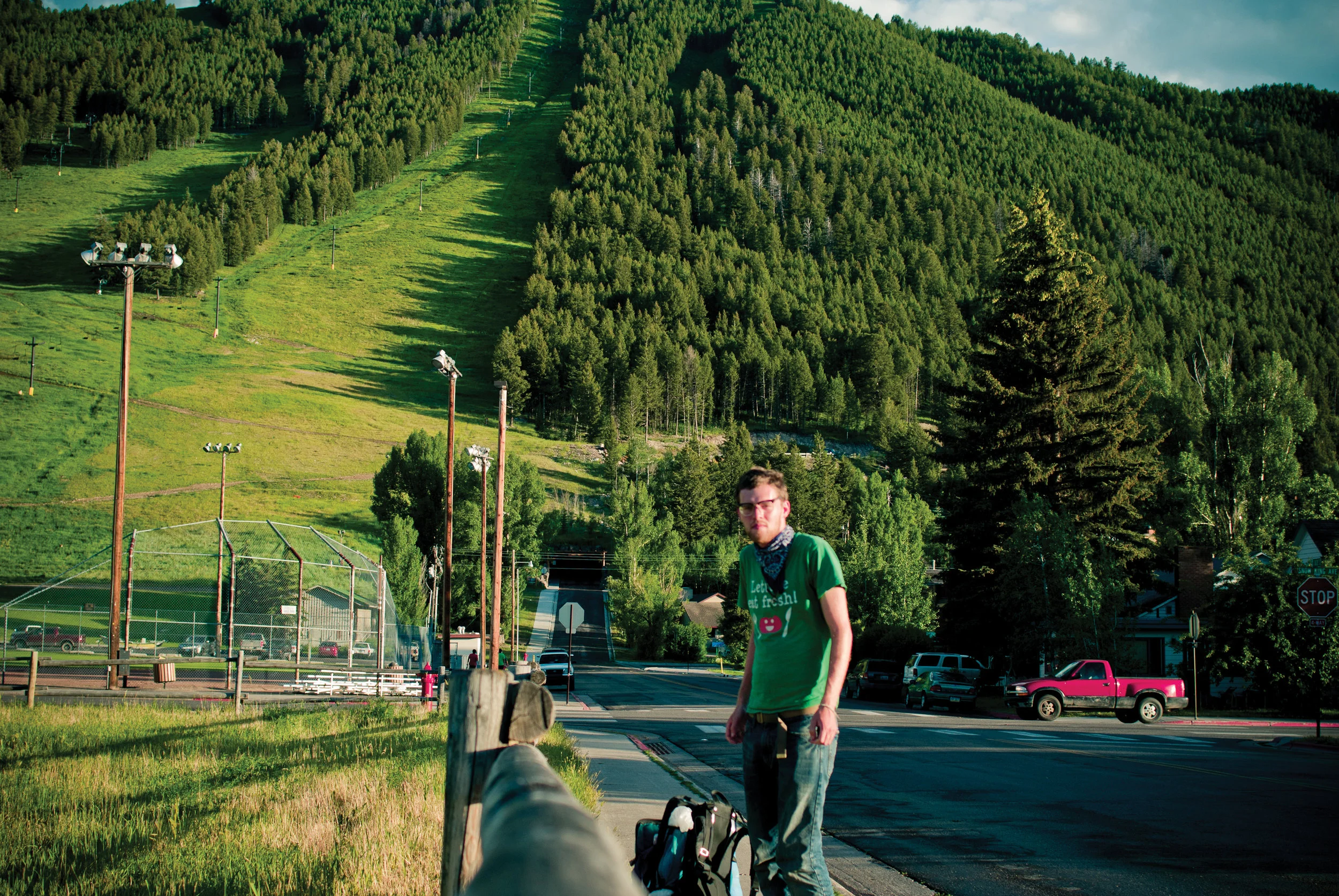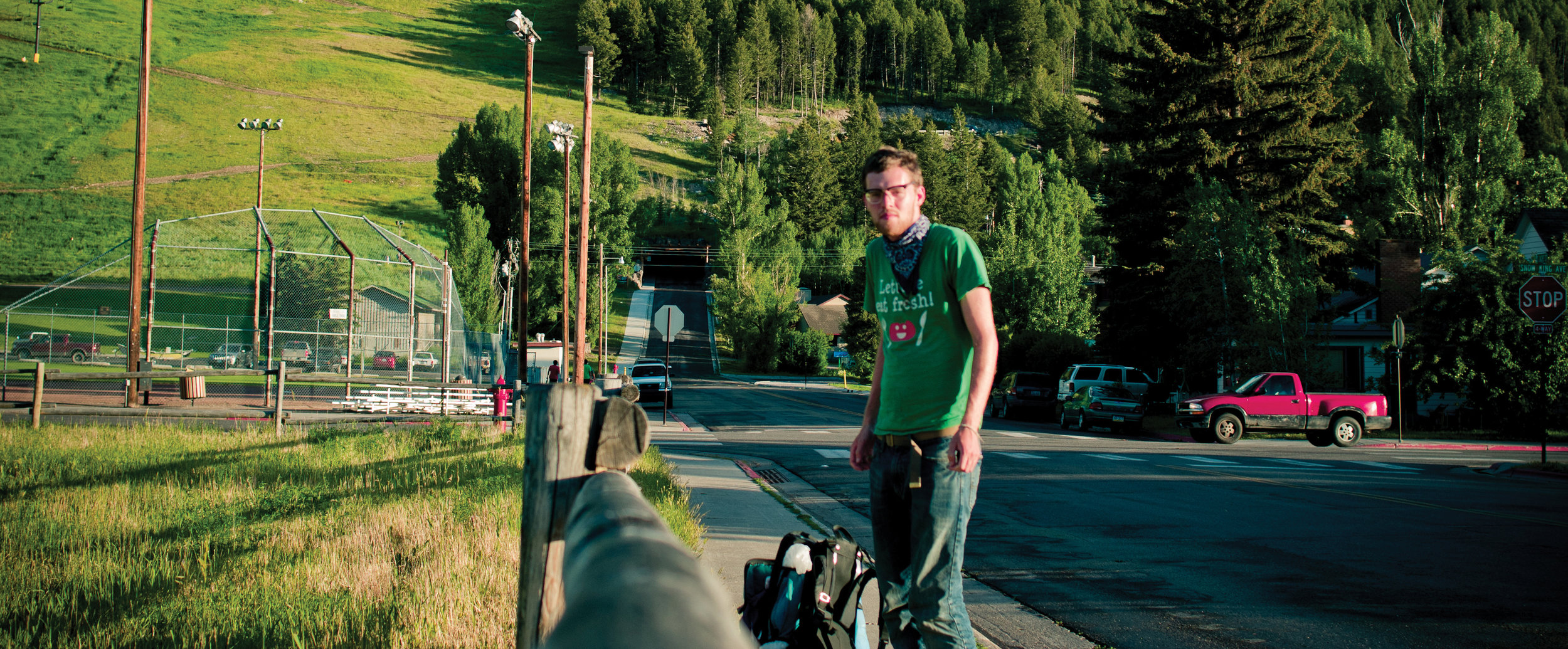Podcaster and photographer Jeff Emtman talks truth, avoiding over-narration, and plunging into the unknown.
Podcaster and photographer Jeff Emtman on the road looking for stories, in Wyoming.
Sound Matters
Here Be Monsters
Podcast Here Be Monsters probes the deepest, most mysterious parts of our world and imaginations. Its creator, Jeff Emtman talks truth, avoiding over-narration, and plunging into the unknown.
Interview by Nate Budzinski
Emtman took Bang & Olufsen's Sound Matters podcast on a sonic tour around New York earlier this year – listen below.
What made you start Here Be Monsters?
I've only recently figured out where this show truly came from. Through most of my childhood, I was afraid of normal things: physical danger, emotional rejections, the future, etc. I figured that as I got older, my fears would go away – some did. But the ones that didn’t got worse.
By the time I was 22, graduating college, and supposedly “ready for the real world", I felt a paralysing fear of it.
In hindsight, this seems to be the result of a good, nurturing upbringing – I never had to struggle that hard. But at the time, it gave me insomnia. And so my course of action was to start Here Be Monsters, named for the monsters drawn on old nautical maps to denote dangerous, unexplored regions –the fears of the things I didn't understand.
I’ve been making the show for 6 years now. We joined forces with the Los Angeles-based KCRW radio in 2015, which is when I brought on my co-producer Bethany Denton. Bethany knew me back in my insomniac college days, so she gets it. Her style is really wonderful and a bit different than mine. She has been the secret force behind a lot of our most successful episodes, including our wonderful episode on the (now defunct) Satanic Prayer Hotline.
Also, we are really lucky to work with a wide range of outside producers and musicians.
We're comically far from running out of material. It's a sign that we and the rest of society still have a lot of fears. It's overwhelming, but I guess it's good for business though, right?
What’s the difference between the theme of the unknown, as opposed to the mood of the unknown?
For starters, our touted “theme” is a bit of a shorthand, and a bit of a farce. In reality, "the unknown" is so broad it's meaningless. So, when we approach the unknown, it's about the thought process more than the theme.
My part of the show is where we examine something that seems really awful or alien and dissect it really gently – sometimes quite literally. The piece I'm currently working on comes from a Brooklyn-based taxidermist who spends the episode slowly taking apart a parrot: opening the chest, peeling paper-thin skin down the legs, scooping out the brain, etc. And all the while, she just explains exactly what she's doing. [The above episode is now available here – ed.]
There's a meditative element to it – perhaps that's the “mood of the unknown” you reference. Case in point, I've tried listening to my own work during the daytime, while I'm caffeinated and have other things to do. I always wind up hating the show.
But every now and then, I’ll do my critical listening after it’s gotten dark out and I've turned off my computer, taken a shower and drank a beer. I’ll lie on my bed with only a single light on… and then I’ll listen. And then it’s good.
The core of it really, is that we rarely give listeners directives. We don’t say, “I think x and that means you should think x too.” Instead we ask, “Is it possible that we're more ignorant of x than we realise?”; “Is it possible that our fears about x are based on false assumptions?” But then again, Here Be Monsters has taught me to embrace the unknown, embrace being wrong. But I’ve also spent a lot of time with hippies, so take that as you will.
““Silence can make a piece land harder.””
Are all HBM stories from ‘real life’? Where do you draw that line between fact and dramatisation?
Everything we publish is as true as we can make it. However, finding truth in episodes about recollection or lived experience is pretty different than our work that more closely resembles traditional reporting. With such a varied format, it means that we look at a lot of factors when it comes to fact-checking.
We did put out a mostly fictional drama once, with the amazing Eric Molinsky of Imaginary Worlds. But that drama was so intensely unlikely, that it should have presented itself clearly as fiction right around the moment that Eric wound up in a secret laboratory with the re-animated brain of HP Lovecraft.
With that one exception though, HBM is all about truth. Of course, defining “truth” depends on a lot of factors, and our measuring stick for “truth” changes based on whether we're talking about a fact-heavy topic like indefinite confinement of sexual predators, or whether it's more a belief-based topic, like an interview with someone attempting to do a past-life regression in their bathtub.
Every 10 episodes, Beth or I will do what we call a “story story”. These episodes (they all end with the number “1”) are first-person narrative episodes. My most recent “story story” was about a Boy Scout leadership camp I went to as a teenager. The camp’s management conducted an elaborate sting operation to catch my weed-dealing camp counsellor. I tried and failed to seek out other perspectives. So the entirety of the episode is based on my memory. I’m sure I got things wrong, I said as much on the show.
I think there’s a danger of the “story stories” being mixed too deeply with reporting. Story is an important singular tool for communicating ideas, but it’s no a Swiss Army Knife. Story often requires obscuring facts that are relevant, but contradictory. Story expects plot, which is not a feature of reality (unless you believe in fate, and I don’t). So, the tighter a narrative, the more doubts a listener should have.
This is part of the reason that we tend to shy away from “story stories” when we're looking to represent the “truthy truth”. It's hard to do, but I think we've achieved that in both big and small episodes.
There are moments across HBM episodes featuring pauses in the narrative – small breaks for simply listening to the world. Why?
Generally, Beth and I see a lot of danger in over-narration. Over-narration is often a symptom of insecurity, or ego, or the instinct for sign-posting that's been burned into the minds of producers who came of age in the public radio world. It's not to say that narration never happens on HBM, we just examine whether it's necessary, or it falls into one of those categories.
If Beth and I feel the urge to add narration, we first try it with a gap of found sound, silence, or music – we think of those gaps as narration, we're just not the narrators. Listeners will imagine their own narration into those gaps, and narration that is imagined will always be better than what we'd write. Silence can make a piece land harder.





